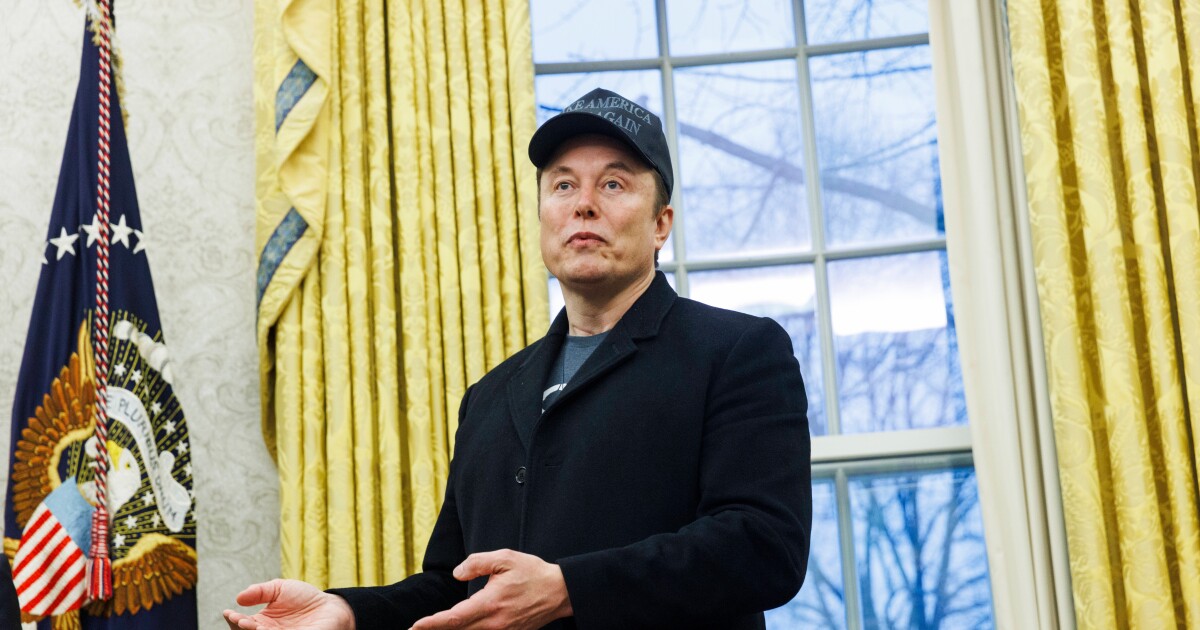The federal cost-cutting effort dubbed the Department of Government Efficiency says it has saved $55 billion in federal spending so far, but its website accounts for only $16.6 billion of that.
And that’s before factoring in an error in the data published on DOGE’s website that mislabels a contract as $8 billion, which was later corrected in the federal database to only be $8 million. That cuts nearly in half the total of DOGE’s itemized savings, including from contracts and leases, to about $8.6 billion.
Elon Musk — President Donald Trump’s advisor who has been the figurehead of DOGE — has pledged that the cost-cutting enterprise would provide “maximum transparency” and that “all of our actions are fully public.”
But DOGE’s accounting raises questions about the reliability of its self-reporting and its level of accountability. Despite its name, it’s not a department, but rather an office within the White House that operates outside the gaze of traditional federal watchdogs, including inspectors general.
Musk’s role in the enterprise has also raised conflict-of-interest questions. His company SpaceX has received billions of dollars in federal contracts. Trump has said Musk will police himself if there are conflicts related to the six companies he runs. The billionaire entrepreneur is required to file a federal financial disclosure, but it will not be made public.
The White House did not immediately respond to a request for comment. DOGE, on its website detailing the listed savings, says it’s working to upload all data “in a digestible and fully transparent manner with clear assumptions, consistent with applicable rules and regulations.” Some contract final termination notices may also have as much as a one-month lag before being posted publicly, it said.
Musk, speaking to reporters in the Oval Office last week, said that some of the things he says “will be incorrect and should be corrected,” adding that DOGE would act quickly to fix errors.
DOGE has swiftly moved through the federal government canceling contracts and cutting thousands of employees across agencies — and at times moving to quickly re-hire employees who had just been terminated.
Their work has been largely shrouded in secrecy about who is involved and what they are doing. In a court filing this week, the Trump administration asserted that Musk doesn’t work for DOGE but instead reports directly to Trump, a move that would shield him from some transparency laws.
Itemized list
After criticisms from Democrats, federal unions and others about the lack of specificity in DOGE’s actions, the entity’s website has recently begun providing more detail, including an itemized list of about 700 canceled contracts with estimated savings as of Tuesday. An additional nearly $145 million in real estate-related savings were also listed.
The most expensive contract that DOGE claims to have slashed is $8 billion to D&G Support Services, LLC to provide services for the Office of Diversity and Civil Rights within U.S. Immigration and Customs Enforcement, starting in late 2022.
Except the math doesn’t support an $8 billion contract value. In recent years, ICE’s entire annual budget hovered around $9 billion. The agency’s largest awarded contracts of the past three fiscal years, according to usaspending.gov, were $800 million for charter flight services and $787 million for transporting unaccompanied children and families.
A search of the Federal Procurement Data System for the contract ID number included on the DOGE website — 70CMSD22A00000008 — returns several documents. The original contract filing from September 2022 does, in fact, list $8 billion as the total contract value. Yet an update on Jan. 28 adjusted the total contract value to $8 million — the same day the DOGE site uploaded the contract as an $8 billion saving.
Two more filings show up, on Jan. 29 and Jan. 30, indicating first the partial and then full termination of the contract. Both of those show the $8 million total contract value. D&G did not immediately respond to a phone call and email requesting comment after business hours.
D&G Support Services, based in a suburb near Washington, describes itself as a “people-focused company” with fewer than 200 employees on LinkedIn. Its largest government contracts, according to usaspending.gov, were $16 million from the Air Force for staffing support and about $11 million from the U.S. Coast Guard. Its average contract since early 2017 is valued at roughly $1 million.
‘Very good start’
On Tuesday, a federal judge denied a request to temporarily bar DOGE teams from accessing internal government systems and removing employees from U.S. agencies, handing Trump a win on one of his signature initiatives.
The ruling rejected a bid for immediate court intervention from Democratic state attorneys general who contend Musk is exercising power to reshape the U.S. government that is supposed to be reserved only for high-level, Senate-confirmed officials.
The Trump administration has praised Musk’s effort, and indicated far more is on the way.
Treasury Secretary Scott Bessent echoed claims that DOGE had found an estimated $50 billion savings so far, in an interview with Fox News Tuesday, and called it a “very good start.”
Trump, in a joint appearance alongside Musk with Fox News host Sean Hannity that aired Tuesday, said Musk’s effort is “finding billions — and it will be hundreds of billions of dollars’ worth of fraud.” Musk, meanwhile, reiterated his overall goal to reduce the deficit by $1 trillion.
Yet it’s unclear how DOGE would get to those sums even with deep cuts, especially as Trump has pledged it won’t touch Social Security, Medicare and Medicaid programs.
U.S. discretionary spending totals about $1.8 trillion annually, nearly half of which is military spending. DOGE is set to start looking at the Defense Department among its next targets for review.


 Economics1 week ago
Economics1 week ago
 Economics1 week ago
Economics1 week ago
 Economics6 days ago
Economics6 days ago
 Finance1 week ago
Finance1 week ago
 Blog Post7 days ago
Blog Post7 days ago
 Economics1 week ago
Economics1 week ago
 Personal Finance6 days ago
Personal Finance6 days ago
 Economics1 week ago
Economics1 week ago












